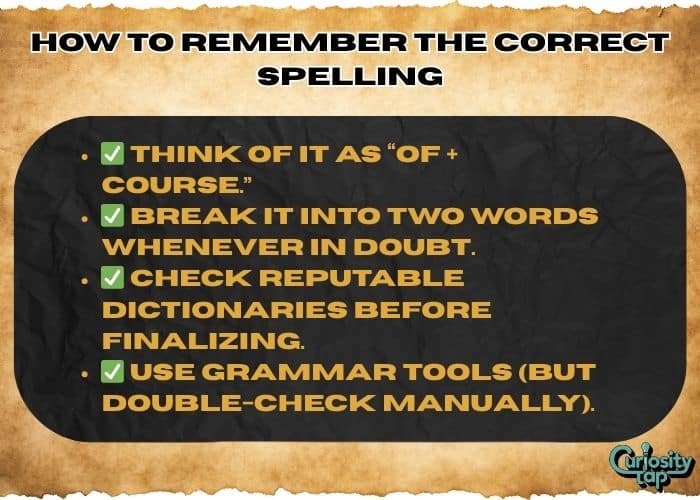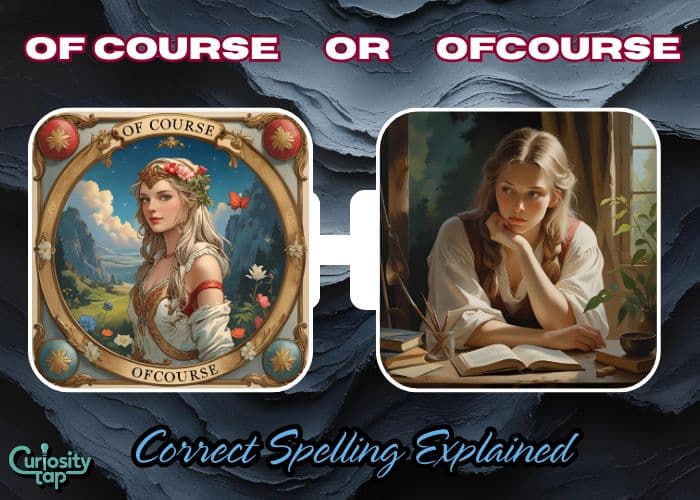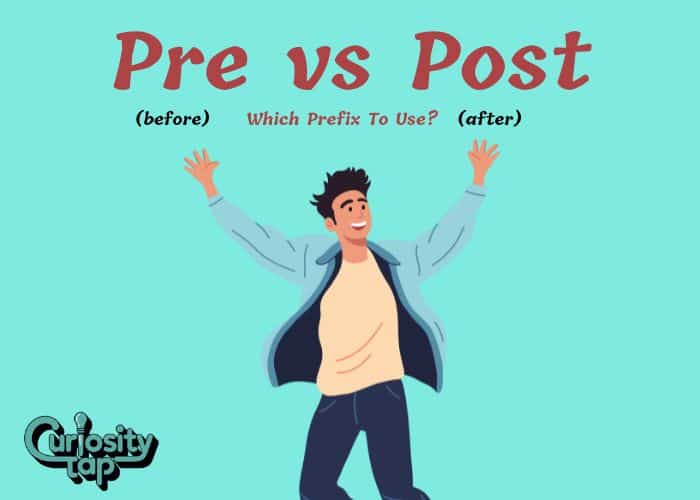English learners, students, and even native speakers often get stuck on small spelling details. One of the most common confusions is whether the correct form is “of course” or “ofcourse.”
At first glance, the one-word version might feel right because of how quickly we say it in speech. But is it actually correct? Let’s clear the confusion once and for all.
Why Spelling Matters in Everyday Communication
Small spelling choices can have a big impact. Whether you’re writing an email, a blog post, or even a social media caption, using the wrong form can undermine credibility. For professionals, students, and writers, choosing the right spelling of “of course” ensures clarity and helps you look polished.
The Correct Form: “Of Course”
Why “Of Course” Is Right
The correct spelling is “of course” (two words). The phrase has been part of English since the 18th century and is widely used to express agreement, certainty, or obviousness. For example:
- “Of course, I’ll help you with your assignment.”
- “It was, of course, the right decision.”
Common Grammar Rule
It combines the preposition “of” with the noun “course.” Together, they create an idiomatic expression that means naturally or certainly.
Why “Ofcourse” Is Incorrect
A Frequent Misspelling
The form “ofcourse” does not exist in standard English dictionaries like Merriam-Webster, Oxford, or Cambridge. It’s considered a misspelling, even though people mistakenly use it online.
Digital Influence
Search engines and autocorrect tools sometimes allow “ofcourse” to slip through. In fact, Google Trends data shows frequent searches for “ofcourse,” highlighting how widespread the mistake has become. But in formal or professional writing, it should be avoided.
Also Read:
Challenge or Challange: Correct Spelling & Usage Explained
Potatoes or Potatos: Correct Spelling And Usage Guide
Shiny or Shiney: Which Spelling Is Correct?
Usage or Useage: Which Is Correct and Why?
Pre vs Post: Which Prefix To Use?
Real-Life Example: A Job Application Slip-Up
A few years ago, a graduate applying for a competitive internship submitted a cover letter filled with enthusiasm. However, he wrote “ofcourse” multiple times. The recruiter later admitted that, although the applicant was strong, these errors left an impression of carelessness.
This example highlights why mastering such “small” details matters. Employers, professors, and clients often equate correct spelling with professionalism and attention to detail. Writing “of course” correctly can make a difference between being taken seriously or overlooked.

How to Remember the Correct Spelling
Here’s a quick checklist you can follow:
✅ Think of it as “of + course.”
✅ Break it into two words whenever in doubt.
✅ Check reputable dictionaries before finalizing.
✅ Use grammar tools (but double-check manually).
| ❌ Wrong | ✅ Correct |
|---|---|
| ofcourse | of course |
| Ofcourse | Of course |
Other Commonly Confused Expressions
Similar Cases in English
- A lot vs. Alot → Always “a lot” (two words).
- Every day vs. Everyday → Depends on meaning (adverb vs. adjective).
- All right vs. Alright → “All right” is more widely accepted.
These examples show how English frequently splits phrases into two words, even when spoken quickly.
FAQs About “Of Course”
Is “ofcourse” ever acceptable in informal writing?
No. Even in casual writing, “of course” (two words) is the only correct form.
Why do people write “ofcourse”?
Mostly because in speech the two words flow together, creating the illusion of a single word.
Does “of course” have synonyms?
Yes alternatives include naturally, certainly, absolutely, and without a doubt.
Can I start a sentence with “Of course”?
Absolutely. Example: “Of course, you’re welcome to join us.”
Is “of course” formal or informal?
It works in both contexts, but in formal writing, it should be used sparingly to avoid sounding casual.
Pros & Cons of Using “Of Course”
Pros
- Universally recognized as correct.
- Works in both spoken and written English.
- Adds emphasis to agreement or certainty.
Cons
- Can sound dismissive if overused.
- Informal tone might not fit academic writing.
Conclusion: Always Use “Of Course”
When in doubt, remember: the correct spelling is always “of course.” The one-word version, “ofcourse,” is a common but incorrect misspelling. Using the correct form not only improves your writing but also boosts credibility.
✔️ Next time you’re drafting an email, essay, or blog, choose “of course” and you’ll never go wrong.
Call to Action
Want to sharpen your English and write successfully every time?
Check out our Grammar Checker Tool and never second-guess your spelling again!
Read our guide on Common English Misspellings to boost your skills even further.
Sources List
Sources:
- Cambridge Dictionary. (2025). Of course. Retrieved from https://dictionary.cambridge.org
- Merriam-Webster. (2025). Of course definition. Retrieved from https://www.merriam-webster.com
- Oxford English Dictionary. (2024). Course, n. Retrieved from https://www.oed.com
Read more knowledgeable blogs on Curiosity Tap
Is this article helpful?

Jackson Pearson is a passionate educator and language enthusiast behind the blog Jackson Pearson. With years of experience in teaching and writing, he specializes in simplifying complex grammar rules, breaking down tricky vocabulary, and crafting learning guides that are both engaging and practical. His mission is to help readers boost their English skills whether they’re beginners or brushing up for fluency. Through every article, Jackson brings clarity, structure, and a spark of curiosity to the world of English learning.



